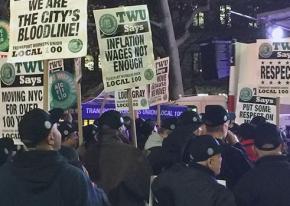NYC transit workers kick off a contract fight
reports from New York City on a rally by transit workers demanding an end to years of concessions by the workers who make the world's richest city run.
SEVERAL THOUSAND members of Transport Workers Union (TWU) Local 100 rallied on a cold Tuesday night in New York City outside the headquarters of the Metropolitan Transportation Authority (MTA) to launch a campaign for a new contract.
The current contract for Local 100, which represents over 38,000 workers who work on New York City's subway and bus lines, expires on January 15. The MTA is jointly funded and run by appointees of the city and the state of New York.
A host of union officers from both the local and parent International spoke from the stage, along with a list of other labor leaders and elected public officials, including New York City Public Advocate Letitia James. Workers waved placards, blew whistles and held banners hailing from their various depots, repair shops and bus barns across the city transit grid.
John Samuelson, the Local 100 president and vice president of the International TWU, finished the rally with a speech on the proposed improvements in the union's bargaining program, which were projected onto the side of the skyscraper in lower Manhattan housing the offices of the MTA.

Local 100's bargaining team is proposing to regain lost ground through wage increases above inflation; abolishing the Tier 6 pension differential (a 2012 pension "reform" signed into law under a deal between Gov. Andrew Cuomo and billionaire former Mayor Michael Bloomberg that raised pension contributions for new hires from 2 percent of salary to 6 percent); and improving facilities and equipment; along with additional protections to prioritize worker safety (subway and bus workers are assaulted, injured and even killed at shocking rates).
The contract campaign comes after New York City unions went without a contract in the final years of Bloomberg's term and then signed contracts with his successor Bill de Blasio that fell far short of making up for the years of falling behind inflation.
Local 100's last contract came in April of 2014, fully two years after the expiration of the previous contract, and contained an 8 percent raise spread out over five years--far too low in a city where rents have increased by 75 percent since 2000.
Along with the legislative attacks on their pensions, the union has also sparred with New York City Mayor Bill de Blasio after his "Vision Zero" plan to eliminate traffic fatalities led to police officers arresting Local 100 bus drivers after some traffic accidents in 2014--a virtually unprecedented practice for workers involved in public sector transportation.
TALK OF a strike and the possibility of Local 100 "shutting it down" were peppered throughout union officers' speeches, and a representative from the TWU International made passing reference to the recent strike by TWU Local 234 in Philadelphia, affecting all SEPTA trains and bus lines in the city.
How much the leadership actually means business remains to be seen, however, since the union has a tradition of reaching 11th-hour tentative agreements just ahead of a strike deadline.
There is also the heavy legacy of Local 100's last strike in 2005, which then-President Roger Toussaint handled poorly--from beginning, with little preparation among the rank and file, to the end, when the union called off the walkout prematurely.
The strike ended with crippling financial penalties imposed on the union--as a public-sector union, the TWU is not legally allowed to strike under New York state law--and a demoralized membership. Out of the rubble emerged a group of reformers who won office in 2009, with Samuelson at the head of their slate.
To prepare for another strike, Local 100 needs to connect its bargaining demands to widespread dissatisfaction with the MTA. The transit system has long been notoriously filthy, but in recent years, increased ridership and decreased government funding has also made it more expensive, overcrowded and unreliable.
There is potential for the union to win over New Yorkers to a vision of a better public transit system, and to tap into the ongoing resentment against establishment politics in New York and across the country.
Much more will have to be done to put the union on a fighting footing. Members need to feel ownership over their union so they are ready to fight for their bargaining demands. That has to include training and organization of rank-and-file members at every worksite. Solidarity with other unions and working-class people generally will be crucial, and every part of the union needs to be oriented to building this.
But a fighting strategy can win. Verizon workers proved that with their East Coast strike, centered in New York City. Now it's the TWU's turn.


